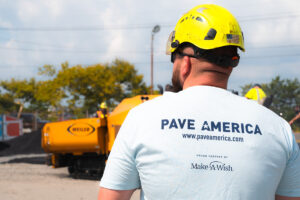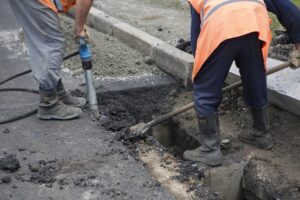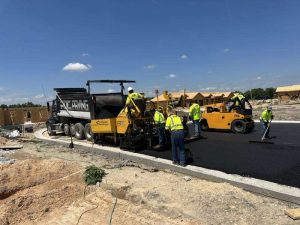Asphalt is an ideal paving material for a wide range of pavements, including highways, parking lots, walkways, and streets. Asphalt paving projects can be completed rapidly and economically, and, when repairs are needed, they are also typically fast and inexpensive. A little routine maintenance can help you ensure that you can avoid expensive repairs and get the most value out of your investment. One routine maintenance procedure that you should be proactive about is asphalt sealcoating.
What Are Routine Maintenance Procedures for an Asphalt Pavement?
The type of pavement and its use determine which routine maintenance procedures you might need. However, the following list details the preventive maintenance procedures commonly recommended by asphalt companies.
1. Crack Repairs: Cracks that are more than about a half-inch wide or deep should be filled or sealed to prevent water infiltration. Water can erode, weaken, and destabilize the foundation that supports your pavement.
2. Sealcoating: Asphalt sealcoating Austin pavements can help prevent damage from vehicle fluids, UV rays, deicing agents, and a variety of chemicals. Reputable sealcoating contractors typically include crack repairs in their estimates, and this can make your job easier.
3. Cleaning: Petroleum-based automotive fluids can damage asphalt by creating soft, crumbly spots that quickly evolve into potholes. Seal coating your pavement will buy you a bit more time to remove these fluids, but they will eventually eat through the seal coat and reach your asphalt pavement. Try to include having automotive fluids removed every six months in your maintenance budget.
4. Sweeping: Dead leaves, loose gravel, and piles of trash can trap water against your pavement, increasing the chances of water infiltration. Furthermore, some types of debris can allow hidden colonies of mold or algae to flourish. A professional sweeping service can clear away debris to make your pavement more attractive as well as protect it.
When Do I Need Asphalt Sealcoating?
Unlike a crack or pothole repair, it may be difficult to visually identify when to have your contractor sealcoat your pavement. Typically, sealcoating asphalt pavements should be delayed for at least three months after installation so that the asphalt can finish curing. On average, a seal coat will have a life expectancy of about two years in the Austin area. However, regardless of the amount of time that has passed since your last application, if your seal coating is cracking, flaking, bubbling, or peeling, you should immediately call your contractor to assess its condition.
How Do Contractors Apply Asphalt Sealcoating?
Depending on the nature of your pavement, sealcoating contractors typically follow the steps shown below.
1. Erect traffic control devices to secure the work area. These devices are typically left in place until the following day.
2. Clean the pavement thoroughly.
3. Ensure that there are no significant repairs that have not been made.
4. Apply a primer to oil stains, areas with polished aggregates, or, in some extreme cases, to the entire pavement.
5. Cut in the seal coating around the edges of the pavement, near structures, or around landscaping islands.
6. Apply a thin layer of seal coat, allow it to dry, and then apply a second coat.
7. When sealcoating asphalt parking lots, it will be necessary to repaint the pavement markings and stripes. This can commence as soon as the second coat has dried sufficiently.
8. Remove any debris from the job so that the site is left neat and clean.
RDC Paving is a highly respected Austin paving company serving the metropolitan area and many other towns throughout Central Texas. We offer sealcoating, asphalt driveway paving, commercial asphalt paving, asphalt repairs, asphalt crack repairs, asphalt overlays, parking lot striping, asphalt milling, parking lot maintenance plans, concrete repairs, and concrete curbing. We are known for the exceptional quality of our work, our superb customer service, and our unparalleled professionalism. We make it easy for you to request a free quote; simply submit the online form, or, if you would like to speak with us first, give us a call at 512-920-9155.




